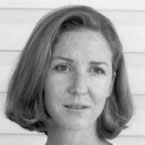Ann Townsend

Ann Townsend was born in 1962 in Pittsburgh, attended Denison University, and received her MA and PhD from Ohio State University. Her poetry, fiction, and criticism regularly appear in such journals as AGNI, Five Points, The Georgia Review, The Nation, The Paris Review, Ploughshares, Poetry, and Witness. Townsend’s two books are Dime Store Erotics (Silverfish Review Press, 1998) and The Coronary Garden (Sarabande, 2005). Her work has been recognized with the “Discovery”/The Nation Award, the James Dickey Prize in Poetry, an NEA Fellowship, and other honors. Townsend, a gardener and trained vocalist, has taught at Denison University since 1992. She lives with her husband, the poet David Baker, and their daughter Kate on a small farm in Granville, Ohio.
They Call You Moody
Such proneness to sadness, such little fits
of life-grinding-to-a-halt:
today three diet cokes can’t erase
the jack-pine limbs that dance maniacally
outside the window. All the world’s
a pathetic fallacy where willows weep
and the two crows striding across the turf
freeze-frame into death’s heads
with every snap of the camera’s
imaginary stutter. Ha ha ha they caw
and carried on the updraft they soar and dip
against the sky’s umbrella. Oh chemicals rich
in the blood, oh minor turbulent despair,
the sky unfolds, rinsed with bluing,
the crocuses snap open on their crazy
hinges. I hear it all, even through glass,
the loosening, the ticks, the groan.
Touch Me Not
“Rembrandt went to extraordinary lengths to fix the
precise tone and bluish pallor of dead flesh….”
—Simon Schama, Rembrandt’s Eyes
They took my glasses and laid them
on a table. They took what rings
I wore. They raised my arm
above my head and I rocked against a pillow
that smelled sweet, like anesthesia,
like meat. I hoped to stay awake
for the operation, to see my thumb
flayed and spread apart
on the table, and pieced back together.
My arm was pinned and held
and treated kindly, rinsed and dried
and spoken to like a fearful dog.
That spring my father’s hand in its death
looked like a claw, unhappily white,
and if I thought I saw a tremor,
a border flexing, it was just a shadow
resting on his finger’s underside
and not his dumb hand beckoning to me.
I must have been crying by then.
His instrument raised the flexor tendons
from my wrist, and with swing music
in the background, the Vercet-induced
vapor and bright lights, I dreamed
“The Anatomy Lesson of Doctor Tulp”
as seen from below, from the dead man’s
view, until finally my flayed hand and wrist
resembled a stringed instrument,
a tiny mandolin, tendons and ligaments
glistening in their residency.
For months before, chill air
surrounded my fingers like a traveling halo,
those I embraced flinched and said
touch me not. A marvel,
a magician’s trick, a whiteness so dead cold
the doctor’s temperature strip failed to register
at all. My love called me little ice cube.
My love opened jars for me
and brushed my teeth.
I wanted to reach in and I did,
to his thumb, flushed with embalming fluid.
I measured my own against it,
and like a paradox of motion and stillness,
Achilles running fast, and faster, going nowhere,
I floated my pulse upon silence
despite his pallor, every line of paint that brought him
forward, despite the unconstructed, awful hands
formed around a block, and pinned there.
Modern Love
The rain streams past the gutters, overflowing
a drain clogged with leaves. From inside
the sound is cool and precise, and though
the door lies open and the light
spills out, the kitchen keeps its warmth.
The refrigerator hums, the girl works on
beneath the pools of light, and the man
outside her window sees her pull
on a cigarette; his eyes follow
the orange-bright tip; he flicks water
from his eyes and wonders what to do next,
how to proceed, whether to use the knife
or his hands to open the latched screen door.
He has never been so wet.
She studies the list on the table, decorum
of crossed-out items—the few that remain.
The rain slows, and the last crickets begin
a feeble song from the pond next door.
So far away, each thinks. He watches her mouth open
in concentration. He must make her
hear him as he meant to be heard:
what they have done has not been wrong.
His hands know their way past the buttons of her dress.
She lifts her eyes to the window and catches
sight of her own likeness in the glass.
She can never stop herself: smiling
at the ghost reflection before her.
He believes she is looking at him.